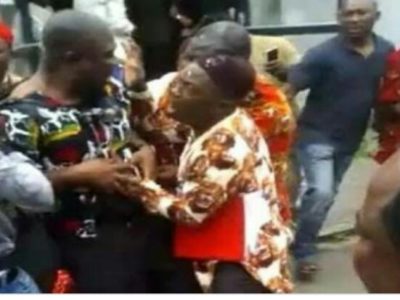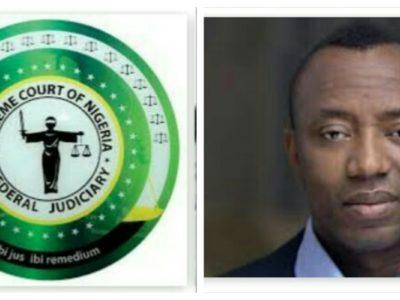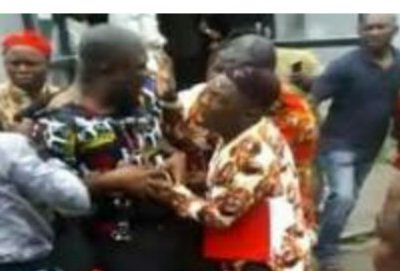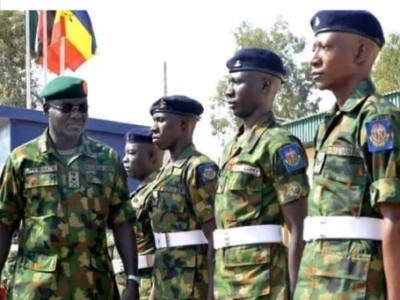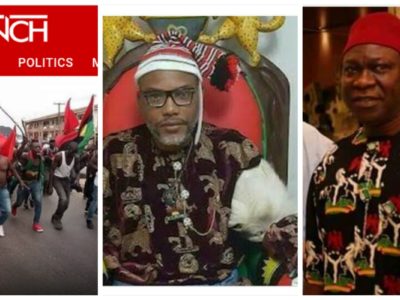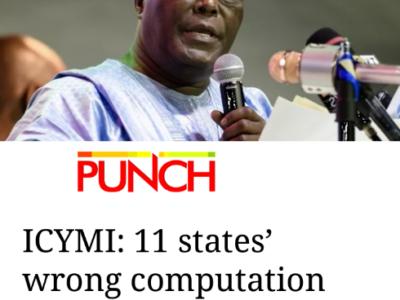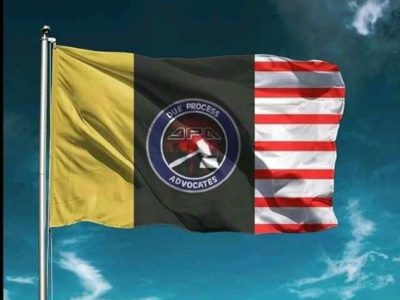One Nigeria: A dream or a nightmare? (Part 1) By Dr. Greg (a Rambo)
Going by history, there is no doubt that since shortly before the civil war, people of Northern Nigeria have wanted one Nigeria. I say shortly before the civil war, because all along up to 1966, it was the Igbos that had wanted one Nigeria the most, and they worked hard to have one Nigeria.
Also, according to history, the Yorubas have been ambivalent toward the concept of one Nigeria. That is to say: the Yorubas are ready for either way - one Nigeria or a divided Nigeria, depending on the circumstances.
Sequel to the events of 1966, leading through the civil war, the Igbos lost faith in one Nigeria. Since the civil war, that faith has never been restored. The government of Nigeria became dominated by the people of Northern Nigeria with a clear policy of deliberate exclusion of the Igbos.
To the Igbos, the notion of one Nigeria has never been a reality since the war. However, the Igbos were never united on what to do since the civil war. To some Igbos, one Nigeria has been a dream that is possible. And to some other Igbos, it has been a scary nightmare. So, the Igbos are divided between those who think that one Nigeria is an affordable possibility worth exploration and support and those who are convinced it is a futile exercise that must be discarded completely and now.
The greatest and hottest undercurrent in Nigeria today or the most strategically significant division in Nigeria today is not between the North and the East or even between the rest of Nigeria and the East. Rather, it is between the two Igbo factions, ie, the Igbos that believe in giving the idea of one Nigeria a chance and those that reject the idea of one Nigeria.
Again, note that no Igbo person believes that we already have a perfect Nigerian union worth preserving. They all agree that Nigeria is sick. The division is between those who believe that the sick country is curable and those who believe it is not curable.
The Igbo political class - State Governors class, Legislators class, the wealthy Igbos who have acquired wealth they want to protect, the intelligentsia who have hope in upward mobility under the current system, tend to believe that Nigeria is curable and they are the ones seeking restructuring of Nigeria. Let's say that this group of Igbos are represented by Senator Ike Ekweremadu. (This is just to help you understand the argument).
Then you have the other group of Igbos who believe that Nigeria is incurable and there is no need to try to give it any further trial. This group are made up of mostly the youth, those who have been disenfranchised, the bottom of the middle class Igbos and the lower class. This group is agitated, mobile and aggressive and you see them in large numbers in the Diaspora, which comprises mostly of those forced out of Nigeria by the inequities inherent in the Nigeria that exists. This group does not believe in restructuring. It wants secession. This group is represented by IPOB.
We view this division between the two Igbo ideological groups, as the critical and most decisive division today on the question of one Nigeria. As long as these two groups cannot resolve their differences and come together, neither of them can succeed.
Thus, there will be the initial or preliminary war. That will be the war between the two Igbo factions described above. This doesn't have to be a shooting war. But that war must be fought and won before there can ever be the main war between Nigeria and the Igbos.
This first or initial war has started. What happened in Germany with Ekweremadu is a flashpoint in that war. What happened in Germany may appear to some as a mere coincidence. But viewed closely, it has been in the making over the past 6 years - the discontent has simmered and we are at the moment when a major crisis is about to crest. Unfortunately, Ekweremadu, Nnia Nwodo and the Governors are misreading what is happening. They are viewing these events through the lens of yesterday.
This writer will forecast that in the emerging war between the two Igbo factions, those who believe in restructuring Nigeria will lose and those who believe in secession will win. It may take time, but the group represented by the youths will win. (This doesn't mean they win the ultimate war)
The restructuring faction will lose because two factors work against them. First, the leaders of the restructuring faction are not trusted by those that are neutral. They comprise a greedy and exploitative and corrupt class who have not shown much interest in the welfare of the average Igbo person. They are also perceived as proxy for the North. Their message is perceived as self-serving, designed for self preservation. Secondly, the failure of the people of the North to make any concessions to the Igbos will further lead to the defeat of the restructuring faction.
To buttress the point above, the fact that the North is refusing to concede the presidency of Nigeria to the Igbos, a huge strategic mistake by the North, will further weaken the position of restructuring faction and play straight into the hands of the secessionists.
(This analysis will continue in two more parts)
What happened to the rape case against Pastor Fatoyinbo?
The complaint of rape made by Mrs. Busola Dakolo against Pastor Biodun Fatoyinbo, the senior pastor at the COZA faith ministry, has probably gone the way of most cases against the rich and powerful in Nigeria. That is to say, the police killed the case in order to protect the rich and a paying client of the police.
Otherwise, how could the police declare an investigation inconclusive simply because the suspect that is within their reach refused to answer police invitation? By so doing, the police can be taken as saying that the investigation had gone cold, that they had followed all the leads and got nowhere. But if they have not been able to interview the suspect, they have failed to follow the most probative lead.
As reported in the Premium Times, the police "set up the five-member panel to investigate the rape allegation leveled against him [Fatoyinbo] by Busola, wife of popular singer, Timi Dakolo. The embattled cleric said he did not appear before the panel because it appeared biased.
"He also added that he was advised by his lawyers not to appear before the panel because it was prejudiced and may not conduct an impartial session."
This case has been marked by a cruel irony and deceit. First, when the lady reported that the powerful, rich and well connected pastor raped her 20 years ago when she was 17 years old, the police failed to investigate the complaint and no reason was given for turning a cold shoulder to the lady. Frustrated by the indifference and believing that the police were compromised, the lady took her story to the press.
Mrs. Dakolo's media interview that alleged rape against Pastor Fatoyinbo became a sensation. A country that normally ignored such allegation and blamed the victim suddenly came alive with unprecedented outrage against a suspected rapist. The spontaneous reaction took everybody by surprise. Human rights and women groups protested with placards in front of COZA churches. The pastor promptly placed himself on leave while he continued to deny the allegation. There was hope that this case might change for good and better the way Nigerian address cases of rape.
Like a typical Nigerian rich man accused of some crime, Pastor Fatoyinbo turned the police against the accuser. He filed a petition with the police accusing Mrs. Dakolo and her husband of defamation. As typical of the Nigerian police, the police ignored the rape allegations and went after the woman and her husband for defamation. In a clearly calculated effort to frustrate and intimidate, the police issued their infamous invitation letters trying to cause the couple to leave their Lagos abode and travel to Abuja to be questioned. As the couple chalkenged this move, the police staged a shameful attempt to arrest them.
There was a public outcry as many questioned the motive of the police. This embarrassed the Inspector General of the Police (IGP), who directed that both the rape and defamation allegations be investigated in Lagos.
While the Dakolos went to meet with the police, as requested, Pastor Fatoyinbo refused to go. Normally when a complainant fails to meet the police for further investigation into his complaint, the police could treat that as a sign that there is no merit in the complaint. However, when a suspect fails to honor police invitation, the effect is the opposite. The police seemed to have reversed this neat logic in the case of the Dakolos against Pastor Fatoyinbo, by declaring the investigation into the two cases inconclusive just because the suspect (Fatoyinbo) refused to honor the police.
As sad and unfortunate as it is, at least the Dakolos managed to have escaped what was to be a brutal police persecution through the attempt to ignore their rape allegations and prosecute them for defamation in Abuja. Unfortunately, she will not be able to pursue a civil remedy against the pastor because the incident occurred 20 years ago, while a civil cause of action expires after six years from the date of the incident.
For the alleged victim of rape, it is a painful goodbye to justice. For thousands of rape victims ignored by the Nigerian justice, they still have to wait for another occasion when the country's law enforcement will step up the fight against rape and crimes of sexual violence.
Like this post/article? Add your friends to DPA today.
An aggrieved customer could not take it silently
Tesha P Adaeze Nwanma took to Facebook to protest the abuse she suffered in the hands of The Young Shall Grow Logistics Company. The details of her grievance are contained in her public letter to The Young. She wrote:
"Dear 'The Young Shall Grow' Couriers and Logistics,
I am writing this post from a place of anger and so much pain!
I am so angry, I am so pissed , I have cried and I am still raging!
How can your company be so wicked for no reason!
You charge so much for a waybill, a thing as little as a jersey, you charge 2k 3k, as if that's not enough, you will still collect another 500naira from the customer!
I get this calls with customers asking me, 'Why are they collecting another 500 from me' and I will just looking plain stupid over the phone!
When you register these things, they won't give you a waybill number, rather when it gets there, they either send a text or call the person
Now the latest issues I am having now, is that they no longer call the customers
I am having issues in PH, Abuja and Ebonyi.... What's my crime, I used The Young Logistics
Yesterday, I asked one of my customers to go to their office at PH, he was embarrassed, telling him to go and wait for a call, after some drama they had to start searching around for the stuff, after which they still asked him for another 500naira , which I had to transfer to the lady before she accepted to release it
This is frustrating, I am frustrated!
I have received insults, I have been called a thief all because I can't give a reasonable explanation as to why The Young logistics are this mean!
Those of you doing this things, you will reap the fruits of your labours and wickedness in a triple fold!
Even though I have begged and begged and begged my biz partner to stop using the young, but it all falls on deaf ears, at the end, I am the one getting all the heat, insults and blames
The many times that I have used peace mass logistics (despite all the negative things that surrounds that company) I have never had an issue one bit!
Not even one issue, they don't charge much, they will call you and give you your stuff jeje, without asking for money and they won't give you any single stress
I am not happy at all
I am not one bit!
The young had shown me pepper
I am only paying that I come out of this mess, heaven knows that even if I am crazy, I will never go near The Young Again!
Never!"
The case of Sowore and the lingering question of a Nigerian revolution.
Update!
Two days after Justice Taiwo O. Taiwo of the Federal High Court, Abuja, granted an order for a 45-day pre-indictment detention of Sowore under the Nigeria's terrorism laws, Sowore's lawyer, Mr. Falana, filed an application to vacate the order. That set a fairly predictable direction for the case.
The application to vacate had the strategic relevance of forcing the agency that arrested Sowore, the DSS, to show its hands more fully. That is, the application alleged that there was no justifiable basis in law to detain Sowore. In a response to such application, the DSS would be forced to show that there was a basis. And this is where a sound knowledge of pure and applied jurisprudence will be needed for one to understand the game.
Being a pre-indictment proceeding, what is the DSS required to prove? What is the requisite standard of proof at this stage of the case? Unlike where an indictment has been filed, the standard of proof at this stage is for the DSS to show that there is a reasonable suspicion.
Let me take you back to earlier lessons we gave in the forum. In a standard criminal case, you will go through three different standards of establishing the merits of formal constraints imposed on a person by law.
At the initial stage , there is the standard to be met in order for a person to be arrested. That is known as reasonable suspicion. Once a police officer has a reasonable suspicion that you committed a crime, he can arrest you. Reasonable suspicion is the standard.
After you have been arrested and charged; the standard required for you to be charged and for the court to accept to try you is known as prima facie case. Once the prosecutor can show that there is a prima facie case against you, the court will proceed to trial.
And finally, for the court to find you guilty, there is the final standard known as proof beyond reasonable doubt.
So, in Sowore's case, the suspect has not being charged. So, the standard is low - reasonable suspicion. And this is where Nigerian legal system shows it is still backward. By not having charged him, all that they are required to do is to show they have reasonable suspicion, which is a highly subjective test.
It was therefore possible for the DSS to come up with unsubstantiated allegations of Sowore collecting millions of dollars to topple the government. Those allegations are most likely untrue. But they are not required to prove it is true because we are still at the level of reasonable suspicion. All DSS needs to do now is to make any allegation they like. It is impossible for the Judge to say that a suspicion is unreasonable. So, we can conclude that the application to vacate the detention order will fail.
When the case goes all the way to the point where Sowore is charged, then they will be required to prove that there is something worth pursuing. The DSS will fail to prove the case in the end, but the damage would have been done to Sowore.
Note: Rambo is aware that a parallel proceeding was filed in Lagos and a Lagos court may have issued an order favorable to Sowore. We believe that having conflicting orders will only give the DSS the excuse not to obey any order it does not like by claiming it was confused by the orders.
The attack on Ekweremadu, truly a wake-up call
The issue at stake is actually about the heart and soul of the agitation for justice and equivalent for the Igbos, whether such agitation takes the form of sovereignty or other forms. I said whether sovereignty or other forms because there are still other options including reviving the Aburi Accord.
But we need not address the final status yet. We just need a roadmap. Without any roadmap yet, it will be difficult to jump to the final status question.
Who should lead the Igbos on the National identity quest? This is the question the Igbos should answer. What role will the Igbo elites play? Are they going to stand on the sidelines and watch in concealed panic as their less informed, and yet the most deprived, brothers seek to provide leadership?
All over the world, there are Igbo medical doctors, Igbo lawyers, Igbo scientists, Igbo academia, etc in top positions in their fields. Where are those Igbos? They must not sit back and allow thugs and rabble rousers to lead the Igbo National identity project.
Unless the Igbos are led by their best hands, the Igbos will not come out with the best results. Instead, there will be crisis and failure of the dreams.
What happened to Ekweremadu is a clear wake-up call. The Igbos could do much better than that. The mob cannot lead the Igbos. But it is difficult to blame the mob or to stop it from assuming leadership if the Igbo elites continue to stay on the sidelines.
It is quite shocking watching the reactions of the Igbos over what happened to Ekweremadu in Germany. More than 90% of the best educated Igbos and their professional class all over the world condemn the incident, while the less educated Igbos and the less privileged jubilate. It was also noticeable that those that support the assault were to derive support and validation from the likes of Femi Fani-Kayode, rather than the likes of Professor Charles Soludo. This means that the Igbo elites are not engaged. They left leadership to the mobs and rabble rousers.
The fact is that the Igbo elite do not have a choice. Their indifference is dangerous - dangerous to the Igbo cause and dangerous to the elites themselves. As the mob leaders turned on Ekweremadu, they will turn on anyone else they believe is more privileged. As they blamed a Senator for not stopping the Fulani herdsmen attacks, they also will blame the lawyer and the doctor for not condemning those attacks. When they are done attacking the Senators, they will continue indefinitely to attack anyone perceived and presumed to be ahead; only because he supported the enemies of the Igbos.
It is a wake-up call for the Igbo elite to step forward to avoid a looming disaster.
Evidence shown of the mistrust of the Nigerian military
Nigerian military has been moving heavy military equipment from Enugu across several Eastern states. Such movement triggered fears and concerns, as people wondered what it meant.
Naturally, the Nigerian civilians associate with the Nigerian military atrocities against the civilians. 'Operation Python Dance', an euphemism for a rootless crackdown on presumed members of Indigenous People of Biafra in 2017, is fresh on people's minds.
Apart from that shameful attack on unarmed civilians, Nigerian soldiers have on countless occasions waged wars against totally unarmed civilians. And yet, this is an army that had price incompetent in fighting against an insurgency in the Eastern part of the country.
On this occasion of an apparent movement for standard military exercise, the military was forced to make statements calming the aggravated population down.
As the Punch reported on this matter, "the Nigerian Army has urged South-East and Cross River State residents not to panic over the massive movement of troops, military vehicles and weapons as it holds a week-long military exercise."
The Deputy Director, Army Public Relations 82 Division, Col. Aliyu Yusuf, was reported to have made an appeal in a statement issued to the News Agency of Nigeria on Saturday in Enugu. He said the movement of weapons and equipments is for a military exercise known as the 2019 Combat Proficiency Competition for Formations under the 82 Division of the Nigerian Army".
The 82 Division of the Nigerian Army is based in Enugu.
The questions emanating from this are the application of the mistrust between the general population and the Nigerian Armed Forces. And what is the long-term strategic impact of this on the Nigerian defense capabilities? What war is the army training against in the Eastern part of Nigeria, when the Northeast remains undefended and vulnerable to insurgency? Shouldn't the army rather focus on defeating the insurgency?
The IPOB attack on Ekweremadu is a big deal.
The DPA News analysts are wondering what to make of the widely reported assault on Senator Ike Ekweremadu yesterday in Nurnberg, located a few miles Southeast of the famous city of Nuremberg, in Germany.
Senator Ekweremadu, one of the most successful Igbo politicians in the modern times, had been attending an Igbo diaspora cultural event in Germany when the incident occurred. He had been invited along with the leader of the Igbo social cultural group, known as Ohaneze, Chief John Nnia Nwodo. For some unknown reason, Nwodo avoided the event.
At the venue of the diaspora event, a group of men, apparently members of IPOB arrived at the event and disrupted the proceedings. In the process, they manhandled Ekweremadu, as was clearly captured on a video clip that has gone viral.
The grievance of the unruly mob was not clearly articulated. But it had to do with killings of civilians in the Igbo areas in Nigeria by the Nigerian military. The group seems to believe that the Igbo politicians have not been doing enough to stop these killings. This is a fairly legitimate grievance, and quite justified.
However, the choice of Ekweremadu and the method of expressing this grievance have raised multi-faceted questions about the Igbo agitations for sovereignty, the IPOB, and actually the position of the top Igbo political elite in that agitation.
IKE EKWEREMADU:
Using Ekweremadu as a representative of the top Igbo political elite, it is clear that there is a serious disconnect, characterized by tension and hostility, between members of IPOB and the Igbo political elite. This is not the first time, the IPOB members have attacked Igbo political figures, ranging from some Governors to even the leadership of Ohaneze. If Chief Nwodo had dared to attend the diaspora events, he would likely have been assaulted as well.
As seen from his statement after the event, Ekweremadu was shocked and embarrassed by what happened. To have been humiliated to a point of being rescued from an Igbo group is a terrible situation for him as an Igbo leader. It is either that IPOB is fundamentally wrong or that Ekweremadu failed in some serious ways as a leader. Or maybe both. And if Ekweremadu failed, then most other Igbo politicians failed.
IPOB AND ITS METHOD:
Ekweremadu apparently sees IPOB as Nnamdi Kanu. Hence, he spoke of his support for the process that led to the grant of bail to Nnamdi Kanu's bail through the instrumentality of another Igbo Senator.
The personification of IPOB as Nnamdi Kanu, is the worst setback for IPOB, as would be the case with any other such organization. Naturally, such personification will tend to dwarf the organization and frustrate every potential for success.
IPOB's tendency to use force, threats and intimidation is not only a sign, but evidence, of a strategic weakness. It reflects an admission on its part that it has not been able to persuade the people through logic and reason. It also reflects a belief on the part of IPOB that majority of the Igbos cannot be trusted to form objective and logical opinion about the IPOB, that they need to be somehow forced into the right place. That is a fundamental weakness.
BIAFRAN SOVEREIGNTY:
With the continued tendency toward failure of the Nigerian State, the objective conditions for the breakup of the present Nigeria continue to coagulate toward fulfilment. Yet, it will be hopelessly foolish for IPOB to expect to succeed in leading that process without the support of the Igbo political elite, the likes of Ekweremadu. If it were that IPOB was having a problem with one of few members of such elite, it will be no problem. But to seek to antagonize the entire class of Igbo elite is a mission dead on takeoff.
The irony of what happened to Ekweremadu is palpable and that was the reason the story went viral immediately. Those members of the Igbo diaspora in Germany, who invited Ekweremadu did not wish for him to be assaulted by a much fewer group of people. What about the interest of the larger group that invited Ekweremadu? Clearly, their interest is different than those of the IPOB? Igbo leaders like Ekweremadu may not be able to publicly identify with Igbos in diaspora for fear of being assaulted by the IPOB.
The implication is chilling. It means that IPOB members are now the enemy of other Igbos. And it means that whenever an Igbo group in diaspora is organizing events, they must either invite the police to keep IPOB members from such events or simply appoint some of their members to knock sense into any IPOB member that comes to disrupt the proceedings.
What happened in Nurnberg should better be an isolated incident that does not represent IPOB. Otherwise, expect other countries to join in outlawing IPOB.
Atiku must have been disappointed by how he almost lost
In the famous court trial of the year, Alhaji Atiku Abubakar summed up his case and claimed the slowest margin of victory anyone could have expected. The press is awash with the story, with Punch Newspapers on the lead.
As reported by Punch:
"The petitioners [Atiku Abubakar and his party] stated through their lawyer, Dr. Livy Uzoukwu (SAN), that a correct computation of the results would give them a margin of lead of 222,332 votes over President Muhammadu Buhari and his All Progressives Congress.
"They stated this in their response to Buhari’s final address, contending that the correct computation showed that they scored 9,426,082 votes against Buhari’s 9,203,750.
"They claimed that reports tendered by a statistician, who was called as one of their witnesses pointing out faults in the result declared by the Independent National Electoral Commission, was not challenged by the respondents to their petition."
Almost every supporter of Atiku, who believed he won the presidential election of 2019, must have assumed it was by a very wide margin. Hence the interest in going to court. But with the figures that Atiku now claims, it is clear that Atiku and his supporters exaggerated their popularity and understated that of Buhari.
Victory is victory, regardless of the margin. That's what Atiku will be saying. But the margin is so close that the best he can expect, if the court gives him what he wants, is the nullification of the election and re-contest. If a re-election is held between the two, Atiku's chances may be worse. The only hope for him is for him to win also on the certificate issue.
It is not a welcome home for the Sheikh
The El-Zakzaky case has become a most complicated case for Nigeria. The Nigerian press is awash with stories of the dramatic repatriation of the Sheikh and his wife from India.
The Sheikh accuses Nigerian, US and Indian governments of frustrating his court approved treatment in India. While the US dismissed the allegation of any American involvement as baseless, Nigerian government has, through its Ministry of Foreign Affairs, provided its own account of events, accusing El-Zakzaky of various acts of bad faith, including some undisclosed plan to seek asylum.
Apparently, the Sheikh saw his medical trip to India as an opportunity to gain further International sympathy for his cause. But when hundreds of Indians picketed the Nigerian High Commission in India, demanding release of El-Zakzaky, it became a nightmare for both Nigeria and India. Hence, no surprise in his repatriation.
The Sheikh arrived Nigeria by noon on Friday, August 16, 2018 and was immediately seized by men of the Department of State Services (DSS) and driven away to a place where they would detain him.
The development has shocked every objective observer. It was a sigh of relief when the court granted leave for him to receive treatment overseas. That was seen as the dawn of a solution to the long standing impasse between the Nigerian Shiite Muslims and the government of Nigeria which has cost each side so much. The dramatic return of the Sheikh thwarts that hope.
This is an opportunity for Nigerian government to show maturity and discipline which has eluded it so far in the handling of this case. The detention of El-Zakzaky has cost Nigeria a lot in security and International relations. Many are seriously wondering the benefit in his continued detention.
To deny him bail while approving foreign medical trip was a disaster. It was because he was not on bail that necessitated the protest against Nigeria in India. Also, the fear of him getting asylum seems to be exaggerated. What is fueling the protests by his followers is his incarceration, not his freedom outside Nigeria. It would have been better to release him on bail, but closely monitor his activities within Nigeria.
It is not a welcome home for the Sheik.
DPA teaches members how to create their employment contract even when the employer failed to give them one
In its usual effort to keep its members informed, DPA offers a guide on how to overcome one major problem workers face in Nigeria. The write up below will be exciting to every person that works for someone else.
HOW TO CREATE YOUR OWN EMPLOYMENT CONTRACT
Many employers will not give you a written employment contract. They just ask you to start work and you keep receiving your salary. But you know that without written terms of employment, your job is not secure and your employer can fire you and deny you your last months salary and any benefits he promised you when you were hired. Unfortunately, it is Nigerian lawyers that tell the expatriates and foreigners not to bother giving employment contracts to Nigerian employees.
One of the marks of being in an underdeveloped country is that no law requires your employer to give you a written employment contract. In other countries that are developing faster, employers are required to have a written employment contract with each employee. The purpose of such written employment contract is to protect the rights of the employee against a sudden change of the terms promised her at the beginning of the employment.
When your employer refuses to give you a written employment contract, that means it is not clear when and why you can be fired or what will happen when you are fired. That means you are totally at the mercy of your employer. If he wants sex and you refuse, you can be fired without pay. If he suspects that his wife likes you, you will be fired. If he likes your daughter and you don't encourage her to be nice to him, you will be fired. And if fired, there is nothing you can do because there is nowhere it was written down that you were even his employee. He can say that all the money he has been paying you was just to help you out on charity. He can claim that you were a volunteer worker in his company, etc. You can't do anything because you have no written employment contract.
The above is a big concern to our members. While we cannot change the situation overnight, we can provide the following useful guide to protect your interest.
(1) The first thing to do is to make sure you keep a record of the job advertisement that you responded to and got the job. Nobody advertising for workers will say he will not pay you and treat you well. Rather, they will describe themselves as successful business that offer competitive employment opportunities. They will say they are looking for well-qualified workers. Keep a copy of this. It will help you if and when your employer tries to say you were just a volunteer that he wanted to help or that you were just an apprentice he offered to train.
(2) During the time you were being interviewed for the job, you would have received several emails and text messages talking about the job. Save all such communications.
(3) During the time you were working for the employer, he would have sent you to third parties or he would have described you in memos and letters to customers and suppliers. Keep copies of such memos for when your employer tries to deny you.
(4) From time to time, find an opportunity to send an email or text message to your immediate manager describing your work and any particular target you met. Keep such messages and his replies in case.
(5) If your employer has a staff manual when you were employed, make sure you keep a copy at home. The courts have held that those staff manuals are contractual in nature and that they contain part of the things the employer and employee agreed as part of the terms of employment.
(6) Keep in safe place every letter of commendation or promotion you received while on the job.
(7) Also keep copies of every query or disciplinary correspondence you received while on the job. When things go bad, the employer will magnify your sins. But having a copy of what it was, when committed will save you from subsequent harmful exaggerations thereof.
(8) If you receive any unusual payments from your employer, find a nice harmless way to obtain a written explanation what the payment was about. The worst thing to happen to you is where your employer suddenly treats your salaries as commission.
Keep all these things in a safe place outside your place of work. Remember that the day you are fired, they may not allow you to return to your desk. Most likely, you will be escorted out to the gate right from your last meeting with the human resources manager. Anything you kept in your desk drawers then belongs to your employer.
If you have 1 to 8 listed above, they will help the court put together the terms of your employment, even if your employer did not give you an employment contract.

